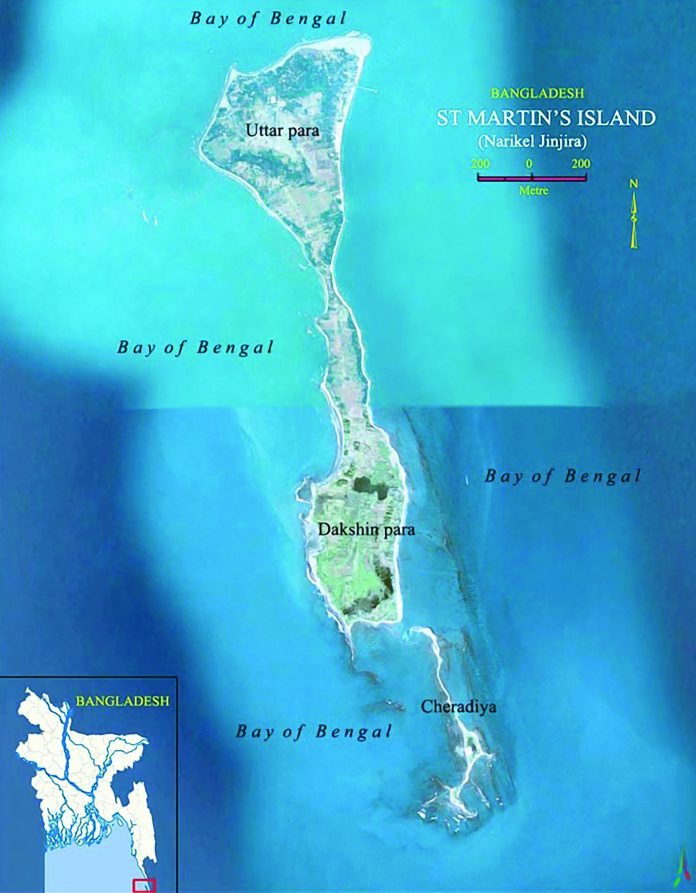Nusrat Mirza
The political landscape of Bangladesh has recently been engulfed in turmoil, with rumors swirling about the involvement of foreign powers in the country’s internal affairs. The dominant narrative propagated by various sources claims that Pakistan and China are conspiring to overthrow the Bangladeshi government. However, a closer examination reveals that this propaganda serves to distract from the real orchestrator of the crisis: the United States. The U.S.’s strategic interests in St. Martin’s Island, coupled with its broader goal of undermining China’s influence in South Asia, appear to be the driving forces behind the current unrest in Bangladesh.
Background on St. Martin’s Island
St. Martin’s Island, a small but strategically significant landmass, lies at the southernmost tip of Bangladesh, close to the Bay of Bengal. Covering an area of approximately 80.06 square kilometers, this island has long been valued for its unique geographical position. While it may seem insignificant at first glance, St. Martin’s Island holds immense strategic value due to its proximity to critical maritime routes and its potential role in regional security dynamics.
The United States, recognizing the island’s importance, has long sought to establish a military foothold there. By doing so, the U.S. could effectively monitor and control key maritime routes in the Bay of Bengal, a vital area for international trade and military movement. Moreover, a U.S. military presence on the island would serve as a counterbalance to China’s growing influence in the region, particularly in relation to the Belt and Road Initiative and the China-Pakistan Economic Corridor (CPEC).
Sheikh Hasina’s refusal and its consequences
The turning point in Bangladesh’s current crisis can be traced back to former Prime Minister Sheikh Hasina’s refusal to comply with a U.S. request that would have had profound implications for the country’s sovereignty. The U.S. had approached Hasina with a proposal to hand over St. Martin’s Island for the establishment of a military base. Such a base would not only have provided the U.S. with a strategic advantage in the region but would have also positioned it to directly challenge China’s economic and military initiatives in South Asia. However, Sheikh Hasina, recognizing the long-term implications of such a decision, declined the U.S. request. Instead, she began to tilt towards China, strengthening diplomatic and economic ties with Beijing. This shift did not go unnoticed by Washington, which saw it as a direct challenge to its strategic interests in the region. Hasina’s refusal to cooperate with the U.S. and her growing alignment with China set the stage for the political crisis that would soon unfold in Bangladesh.
The manufactured revolt
The unrest that has erupted in Bangladesh bears all the hallmarks of a manufactured crisis, carefully orchestrated by external forces to achieve specific geopolitical objectives. While the propaganda machine points fingers at Pakistan and China, the reality is far more complex. The timing of the unrest, coupled with the key players involved, suggests a concerted effort to destabilize the country and remove a government that was no longer serving U.S. interests.
The United States, with its extensive history of meddling in the internal affairs of other nations, appears to have played a central role in fueling the revolt against Sheikh Hasina’s government. By leveraging its influence over certain political factions and using covert operations, the U.S. sought to create an environment of chaos and instability. This environment provided the perfect pretext for a regime change, enabling Washington to install a more compliant government in Dhaka. The allegations against Pakistan and China, therefore, serve as a convenient smokescreen. These nations, despite their respective interests in Bangladesh, have little to gain from the current turmoil. On the contrary, a stable Bangladesh is far more beneficial to both Islamabad and Beijing, particularly in the context of regional trade and security.
The current puppet government
The installation of a new government in Bangladesh, with clear ties to U.S. interests, has raised serious questions about the integrity of the country’s sovereignty. The current leadership, widely regarded as a puppet regime, appears to be more aligned with Washington’s strategic objectives than with the needs and aspirations of the Bangladeshi people.
This shift in power has significant implications not only for Bangladesh but also for the broader South Asian region. A U.S.-aligned government in Dhaka could serve as a bulwark against Chinese influence, potentially disrupting Beijing’s plans for regional connectivity and economic integration. Moreover, the presence of a pro-U.S. government could further complicate Pakistan’s relations with Bangladesh, adding another layer of tension to an already volatile region.
Conclusion
The crisis in Bangladesh is a stark reminder of the complex and often hidden dynamics of global power politics. While the narrative of Pakistani and Chinese involvement in the country’s turmoil is widely circulated, it obscures the deeper, more consequential reality: the United States, driven by strategic interests in St. Martin’s Island and a desire to curtail China’s influence, is the primary architect of the current unrest.
As we assess the unfolding situation in Bangladesh, it is crucial to move beyond the surface-level narratives and consider the broader geopolitical context. Only by doing so can we begin to understand the true forces at play and the potential long-term consequences for Bangladesh and the region as a whole. The crisis serves as a sobering reminder of the importance of sovereignty and the dangers of foreign interference in the affairs of independent nations.
The author is the Chief Editor of Monthly Interaction.







